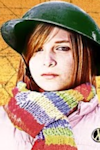 A new show is always an interesting outing; how will it turn out? What's it about? Will I like it? In this case that's; well, Greenham Women and yes.
A new show is always an interesting outing; how will it turn out? What's it about? Will I like it? In this case that's; well, Greenham Women and yes.
The story is based around one gate of RAF Greenham Common during the peace campaign and centres on one of the women, her daughter and one of the American service personel. Needeless to say the woman and officer are separated by more than just a fence and ideology but the catalyst is the daughter, George, who doesn't speak due to an earlier emotional trauma. Some great songs and beautifully drawn characters carry the show along with strong performances especially in the second half when we get to hear some of the great voices let loose. The set is pretty amazing too - gives a real sense of a fence that separates and, in a strange way, joins the communities inside and out.
Particularly enjoyable perfomances came from the amazing Hollie Owen as George (on the night I saw it), LLio Milward, Laura Jan Matthews and Ako Mitchell. Luke Sheppard's direction keeps the pace up and the company work hard to bring the story to life.This is a strong ensemble piece concentrating on the women of the camp but it was good to see such discipline and attention to detail amongst those not at the centre of attention.
The story of the Greenham Common protests is an incredibly complex one to bring to stage, there is enough of it here to provide an honest representation but the core story is of the star crossed lovers and the little girl's journey back to a. It's a fairly identifyable story line without being cliched and it is carried off well. Had I not known there was a computer-based origin to the show then I would not have guessed it - some audience members didn't know and didn't guess. The show was not written by computer so much as outlined and constrained, these things are part of the creative journey and therefore arguably the computer systems did have a significant hand on the process but they are not responsible for the quality of the final show which is down to how Benjamin Till and Nathan Taylor took those raw materials and filtered and honed them into something we could all enjoy.
Forget the technicalities of how it came about, they matter more to the sceintists and Sky Arts than to the audiences ... this is a good night out and an enjoyable new musical. Full stop.
Postscript .....
Ok, I will register an interest, or indeed several. I have known Nathan since he was a young lad, I was even in the first play he wrote. I have seen Nathan in several shows, including Hedwig and am a fan of much of Ben's music, particularly "Oranges & Lemons" and "The London Requiem". Ben and Nathan produced the music for a production of "Much Ado About Nothing" I was in and I was a guest at Ben and Nathan's wedding. Perhaps more unusually (for a theatre reviewer) I am also a published author of technical papers on expert and knowledge-based systems - albeit back in the 1990's and related to numerical and statistical computing - these were not machine learning or AI systems but were at the forefront of the technology at the time. I also spent time in, and still spend time around the RAF. So you can understand that, on many levels, I was fascinated by the announcement of this project. and I read with interest details of the processes that had been gone through.
Unlike some, however, my expectations were quite realistic. Artificial Intelligence is a long way off what we see in films, it is an amazing field which has made huge progress in the relatively short time we have been working on it, but even when a problem is broken down into separate, discrete areas as here (plot, arc, characters etc.) it struggles to be 'creative' - not least because we have not learned how to codify "good" and "bad" outcomes. Think of computer chess systems where we have the ability to judge "quality of result" and operate within a limited (if huge) world of possibilities - they took years to become capable of operating competitively amongst the best players in the world, and were arguably more brute force than brilliant brain. In art and music the possibilities are infinite and there is no commonly agreed "best" outcome, nor any way of algorithmically measuring it. Human creatives with as little training and experience as these programs would not do well and every creative will admit to a drawer (or several bins) full of half-finished or abandoned work - computers are no different, they just don't know how to filter the rubbish from the nuggets of gold. Hopefully this project will lead to funded research into some of these areas which may, eventually, benefot us in as yet unseen ways ... computer aided listening, for example, could hugely enhace diagnostic systems.
The Q&A session after the show I was at with Ben and some of the project scientists, and a chance to meet some of them and one of the Greenham Women in the pub afterwards made this, for me at a personal level, an hugely enjoyable evening. But this is not an AI review and if you want to know more check out the Sky Arts "Computer Says Show" series. See our earlier blog post about the technical how.